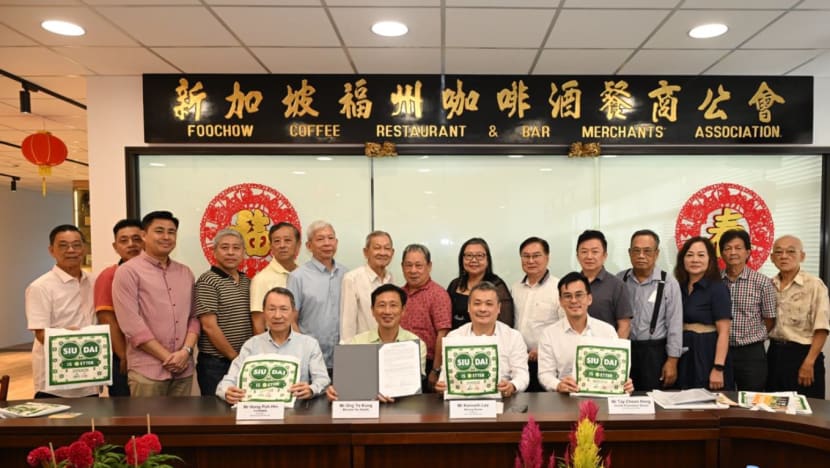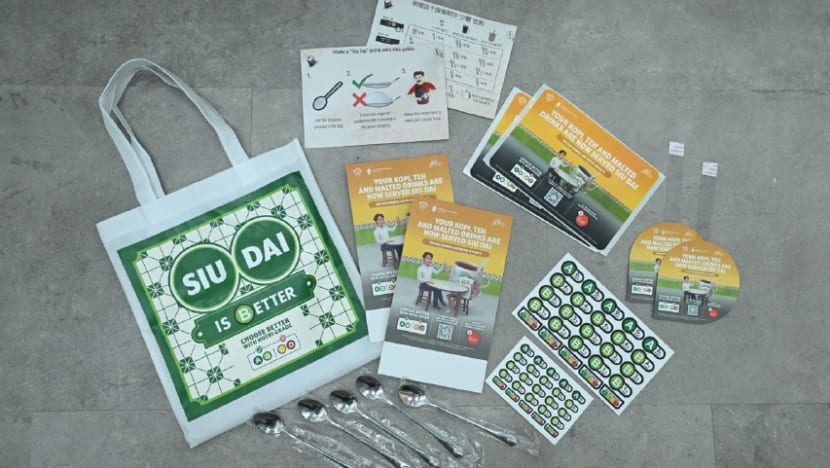Two coffee shop associations pledge support for 'siu dai' or less sugar in drinks movement
To facilitate preparation, HPB has distributed 4,500 "siu dai" kits containing recipe cards and spoons to drink stalls.

(Front row, from left) Chairman of Foochow Coffee Restaurant and Bar Merchants Association Mr Hong Poh Hin, Minister for Health Mr Ong Ye Kung, president of Kheng Keow Coffee Merchants Restaurant and Bar-Owners Association Mr Kenneth Lee, and Health Promotion Board CEO Mr Tay Choon Hong. (Back row) Members from both associations. (Photo: HPB)

This audio is generated by an AI tool.
SINGAPORE: In a bid to encourage food and beverage operators to offer healthier drinks, two coffee shop associations have pledged their support for a movement aimed at making beverages with less sugar, or "siu dai", the norm.
The Foochow Coffee Restaurant & Bar Merchants Association, and Kheng Keow Coffee Merchants Restaurant and Bar-Owners Association have both signed a joint statement of support, said the Health Promotion Board (HPB) on Friday (Mar 1).
The "Siu Dai by default" movement, which was launched by HPB last September, complements the Nutri-Grade labels, which have been in place for freshly made beverages since Dec 30. , Siu dai means less sweet in local parlance,
The movement encourages F&B operators to offer "freshly prepared beverages, such as coffee, tea or malted drinks with less sugar as the norm", said HPB.
The joint statement, which was signed at a dialogue on Feb 21, outlined the coffee shop associations' commitment to advocate for the movement by working with its members to lower sugar content in drinks, it added.
According to Singapore health platform HealthHub, a normal order of kopi (coffee) has four teaspoons of sugar, whereas kopi "siu dai" has 2.9 teaspoons of sugar.
Kheng Keow chairman Kenneth Lee told CNA on Friday that the movement "is good as Singaporeans are very health-conscious" as of late.
"Whatever we eat is with less salt and oil - this is the Singaporean style these days, not like 40 to 60 years back."
Both associations said they would work with their members and strongly encourage them to offer beverages with less sugar, condensed milk and evaporated milk as a default.
They will also work with HPB to drive greater acceptance of "siu dai" beverages among consumers.
Mr Lee said that while it will take customers and association members some time to get used to the push for "siu dai" drinks, it is "very easy to pass down and implement to our members".
"We cannot tell them (members) what to do because they have their own management, and we can only advise them. But I believe that they will follow suit (with the movement) because this is not a bad thing."
"Having both associations and their members on board the 'Siu Dai by default' movement increases the availability and accessibility of siu dai drinks," HPB added.
"SIU DAI" KITS
To facilitate preparation, HPB said that it has, to date, distributed 4,500 "siu dai" kits to drink stalls. They contain recipe cards for less sugar drink formulations and spoons for measuring the right "siu dai" sugar amount.
The stalls that are onboard the initiative can be identified by "siu dai" decals and wobblers displayed at storefronts.
There are more than 300 members under the Foochow association, while Kheng Keow association has over 200 members.
They represent more than 50 per cent of coffee shops in Singapore.
Some of the well-known members under Kheng Keow include Koufu, Ya Kun and Killiney Kopitiam.
Both associations noted during the dialogue that more consumers are "requesting for siu dai or kosong (no sugar) drinks".
They also "highlighted the need for continued public education on the 'Siu Dai by default' movement so that more consumers are aware and will demand for such lower sugar options".
While Health Minister Ong Ye Kung acknowledged last September that this is a "matter of consumer habits and choice", freshly made beverages with less sugar should be "the new norm and default".
"That means if we order kopi or teh (tea) in the future. they are automatically siew dai," he then said.
"If you want more sugar, you have to order kopi ga dai (coffee with more sugar) or teh ga dai (tea with more sugar). If you want even less sugar, you might as well order kosong (no sugar)."
"Put the sugar at your stall, and if somebody wants to add sugar, let them add. But serve it with less sugar as a default."

TOTAL SUGAR INTAKE HAS GONE DOWN
HPB noted that sugar-sweetened beverages are the single biggest source of dietary sugar in Singapore, adding that more than half of Singaporeans' daily sugar intake was from beverages.
This include drinks containing added sugar and juices with naturally occurring sugars, of which 59 per cent comes pre-packaged and 41 per cent freshly prepared.
"Excessive intake of sugar is linked to an increased risk of obesity and chronic conditions such as diabetes and heart disease," said HPB.
Since the announcement of the Nutri-Grade labelling in October 2019, the total sugar intake has gone down from 60g in 2018 to 56g in 2022.
While noting that "individuals themselves must make healthier drink choices", HPB urged more F&B operators to join the “Siu Dai by default” initiative as that would help increase the availability and accessibility of healthier beverages.
















